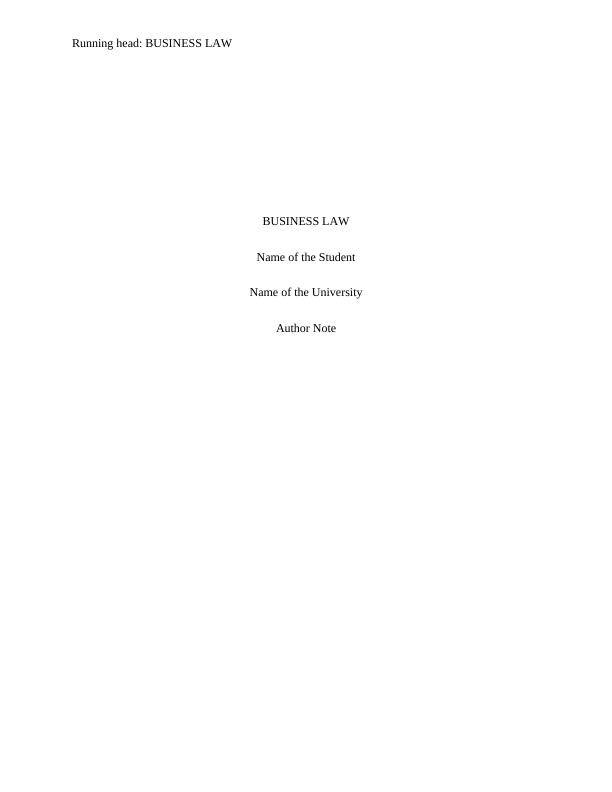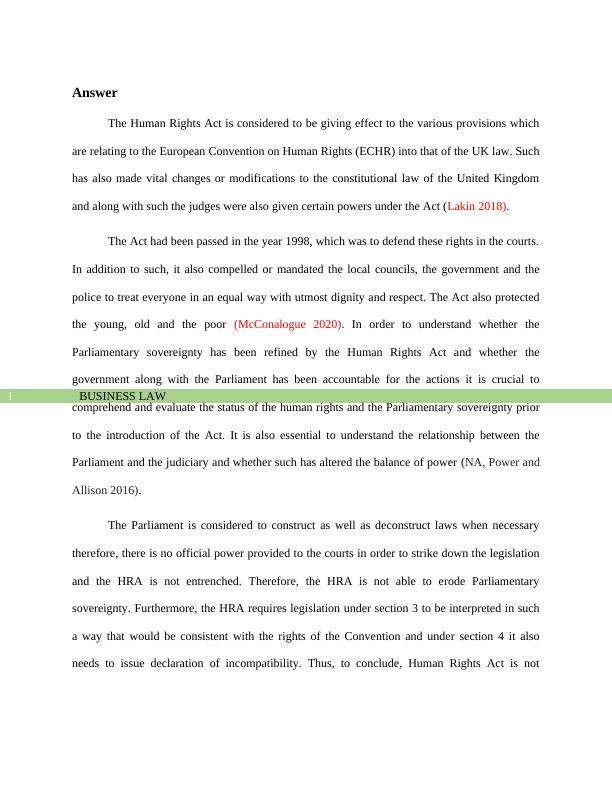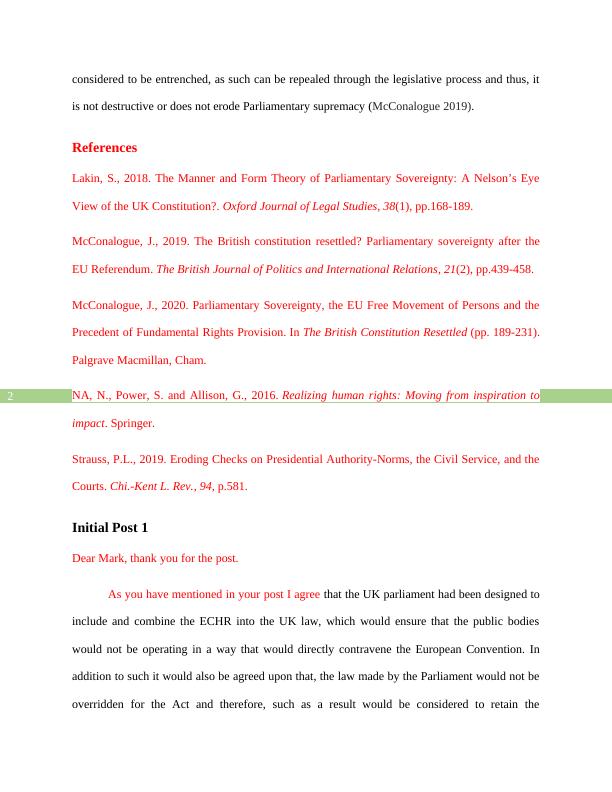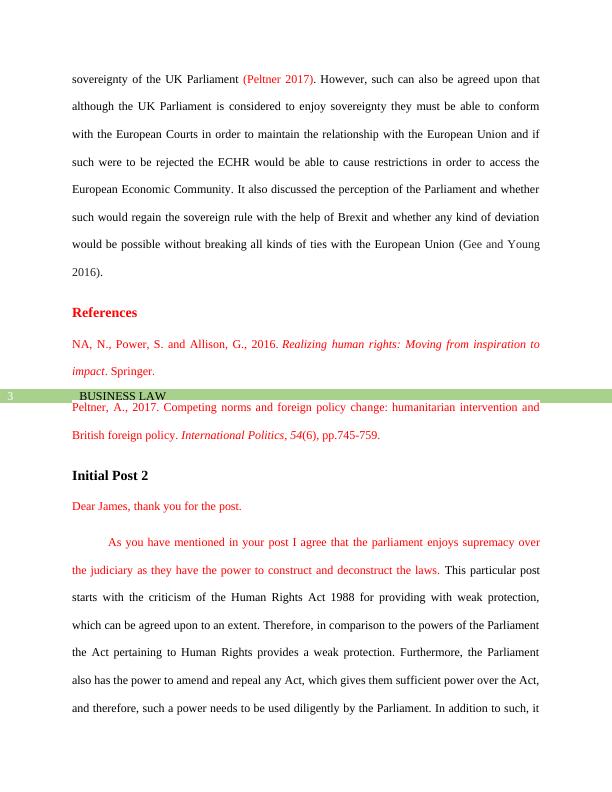Competing Norms And Foreign Policy Change
Added on 2022-09-05
12 Pages3204 Words32 Views
Running head: BUSINESS LAW
BUSINESS LAW
Name of the Student
Name of the University
Author Note
BUSINESS LAW
Name of the Student
Name of the University
Author Note

BUSINESS LAW1
Answer
The Human Rights Act is considered to be giving effect to the various provisions which
are relating to the European Convention on Human Rights (ECHR) into that of the UK law. Such
has also made vital changes or modifications to the constitutional law of the United Kingdom
and along with such the judges were also given certain powers under the Act (Lakin 2018).
The Act had been passed in the year 1998, which was to defend these rights in the courts.
In addition to such, it also compelled or mandated the local councils, the government and the
police to treat everyone in an equal way with utmost dignity and respect. The Act also protected
the young, old and the poor (McConalogue 2020). In order to understand whether the
Parliamentary sovereignty has been refined by the Human Rights Act and whether the
government along with the Parliament has been accountable for the actions it is crucial to
comprehend and evaluate the status of the human rights and the Parliamentary sovereignty prior
to the introduction of the Act. It is also essential to understand the relationship between the
Parliament and the judiciary and whether such has altered the balance of power (NA, Power and
Allison 2016).
The Parliament is considered to construct as well as deconstruct laws when necessary
therefore, there is no official power provided to the courts in order to strike down the legislation
and the HRA is not entrenched. Therefore, the HRA is not able to erode Parliamentary
sovereignty. Furthermore, the HRA requires legislation under section 3 to be interpreted in such
a way that would be consistent with the rights of the Convention and under section 4 it also
needs to issue declaration of incompatibility. Thus, to conclude, Human Rights Act is not
Answer
The Human Rights Act is considered to be giving effect to the various provisions which
are relating to the European Convention on Human Rights (ECHR) into that of the UK law. Such
has also made vital changes or modifications to the constitutional law of the United Kingdom
and along with such the judges were also given certain powers under the Act (Lakin 2018).
The Act had been passed in the year 1998, which was to defend these rights in the courts.
In addition to such, it also compelled or mandated the local councils, the government and the
police to treat everyone in an equal way with utmost dignity and respect. The Act also protected
the young, old and the poor (McConalogue 2020). In order to understand whether the
Parliamentary sovereignty has been refined by the Human Rights Act and whether the
government along with the Parliament has been accountable for the actions it is crucial to
comprehend and evaluate the status of the human rights and the Parliamentary sovereignty prior
to the introduction of the Act. It is also essential to understand the relationship between the
Parliament and the judiciary and whether such has altered the balance of power (NA, Power and
Allison 2016).
The Parliament is considered to construct as well as deconstruct laws when necessary
therefore, there is no official power provided to the courts in order to strike down the legislation
and the HRA is not entrenched. Therefore, the HRA is not able to erode Parliamentary
sovereignty. Furthermore, the HRA requires legislation under section 3 to be interpreted in such
a way that would be consistent with the rights of the Convention and under section 4 it also
needs to issue declaration of incompatibility. Thus, to conclude, Human Rights Act is not

BUSINESS LAW2
considered to be entrenched, as such can be repealed through the legislative process and thus, it
is not destructive or does not erode Parliamentary supremacy (McConalogue 2019).
References
Lakin, S., 2018. The Manner and Form Theory of Parliamentary Sovereignty: A Nelson’s Eye
View of the UK Constitution?. Oxford Journal of Legal Studies, 38(1), pp.168-189.
McConalogue, J., 2019. The British constitution resettled? Parliamentary sovereignty after the
EU Referendum. The British Journal of Politics and International Relations, 21(2), pp.439-458.
McConalogue, J., 2020. Parliamentary Sovereignty, the EU Free Movement of Persons and the
Precedent of Fundamental Rights Provision. In The British Constitution Resettled (pp. 189-231).
Palgrave Macmillan, Cham.
NA, N., Power, S. and Allison, G., 2016. Realizing human rights: Moving from inspiration to
impact. Springer.
Strauss, P.L., 2019. Eroding Checks on Presidential Authority-Norms, the Civil Service, and the
Courts. Chi.-Kent L. Rev., 94, p.581.
Initial Post 1
Dear Mark, thank you for the post.
As you have mentioned in your post I agree that the UK parliament had been designed to
include and combine the ECHR into the UK law, which would ensure that the public bodies
would not be operating in a way that would directly contravene the European Convention. In
addition to such it would also be agreed upon that, the law made by the Parliament would not be
overridden for the Act and therefore, such as a result would be considered to retain the
considered to be entrenched, as such can be repealed through the legislative process and thus, it
is not destructive or does not erode Parliamentary supremacy (McConalogue 2019).
References
Lakin, S., 2018. The Manner and Form Theory of Parliamentary Sovereignty: A Nelson’s Eye
View of the UK Constitution?. Oxford Journal of Legal Studies, 38(1), pp.168-189.
McConalogue, J., 2019. The British constitution resettled? Parliamentary sovereignty after the
EU Referendum. The British Journal of Politics and International Relations, 21(2), pp.439-458.
McConalogue, J., 2020. Parliamentary Sovereignty, the EU Free Movement of Persons and the
Precedent of Fundamental Rights Provision. In The British Constitution Resettled (pp. 189-231).
Palgrave Macmillan, Cham.
NA, N., Power, S. and Allison, G., 2016. Realizing human rights: Moving from inspiration to
impact. Springer.
Strauss, P.L., 2019. Eroding Checks on Presidential Authority-Norms, the Civil Service, and the
Courts. Chi.-Kent L. Rev., 94, p.581.
Initial Post 1
Dear Mark, thank you for the post.
As you have mentioned in your post I agree that the UK parliament had been designed to
include and combine the ECHR into the UK law, which would ensure that the public bodies
would not be operating in a way that would directly contravene the European Convention. In
addition to such it would also be agreed upon that, the law made by the Parliament would not be
overridden for the Act and therefore, such as a result would be considered to retain the

BUSINESS LAW3
sovereignty of the UK Parliament (Peltner 2017). However, such can also be agreed upon that
although the UK Parliament is considered to enjoy sovereignty they must be able to conform
with the European Courts in order to maintain the relationship with the European Union and if
such were to be rejected the ECHR would be able to cause restrictions in order to access the
European Economic Community. It also discussed the perception of the Parliament and whether
such would regain the sovereign rule with the help of Brexit and whether any kind of deviation
would be possible without breaking all kinds of ties with the European Union (Gee and Young
2016).
References
NA, N., Power, S. and Allison, G., 2016. Realizing human rights: Moving from inspiration to
impact. Springer.
Peltner, A., 2017. Competing norms and foreign policy change: humanitarian intervention and
British foreign policy. International Politics, 54(6), pp.745-759.
Initial Post 2
Dear James, thank you for the post.
As you have mentioned in your post I agree that the parliament enjoys supremacy over
the judiciary as they have the power to construct and deconstruct the laws. This particular post
starts with the criticism of the Human Rights Act 1988 for providing with weak protection,
which can be agreed upon to an extent. Therefore, in comparison to the powers of the Parliament
the Act pertaining to Human Rights provides a weak protection. Furthermore, the Parliament
also has the power to amend and repeal any Act, which gives them sufficient power over the Act,
and therefore, such a power needs to be used diligently by the Parliament. In addition to such, it
sovereignty of the UK Parliament (Peltner 2017). However, such can also be agreed upon that
although the UK Parliament is considered to enjoy sovereignty they must be able to conform
with the European Courts in order to maintain the relationship with the European Union and if
such were to be rejected the ECHR would be able to cause restrictions in order to access the
European Economic Community. It also discussed the perception of the Parliament and whether
such would regain the sovereign rule with the help of Brexit and whether any kind of deviation
would be possible without breaking all kinds of ties with the European Union (Gee and Young
2016).
References
NA, N., Power, S. and Allison, G., 2016. Realizing human rights: Moving from inspiration to
impact. Springer.
Peltner, A., 2017. Competing norms and foreign policy change: humanitarian intervention and
British foreign policy. International Politics, 54(6), pp.745-759.
Initial Post 2
Dear James, thank you for the post.
As you have mentioned in your post I agree that the parliament enjoys supremacy over
the judiciary as they have the power to construct and deconstruct the laws. This particular post
starts with the criticism of the Human Rights Act 1988 for providing with weak protection,
which can be agreed upon to an extent. Therefore, in comparison to the powers of the Parliament
the Act pertaining to Human Rights provides a weak protection. Furthermore, the Parliament
also has the power to amend and repeal any Act, which gives them sufficient power over the Act,
and therefore, such a power needs to be used diligently by the Parliament. In addition to such, it

End of preview
Want to access all the pages? Upload your documents or become a member.
Related Documents
The Human Rights Act 1998 and Parliamentary Sovereigntylg...
|8
|2180
|72
European Union Law- Assignmentlg...
|7
|1713
|19
The English Bill of Rights: A Key Step Towards Constitutional Monarchylg...
|4
|2080
|97
Assignment on Law Impact of Human Rights Act, 1998lg...
|6
|1403
|113
The British Constitutional Order: Fusion of Power or Separation of Power?lg...
|8
|2280
|60
The doctrine of parliamentary sovereignty relevant to the UK constitutionlg...
|6
|3533
|290
